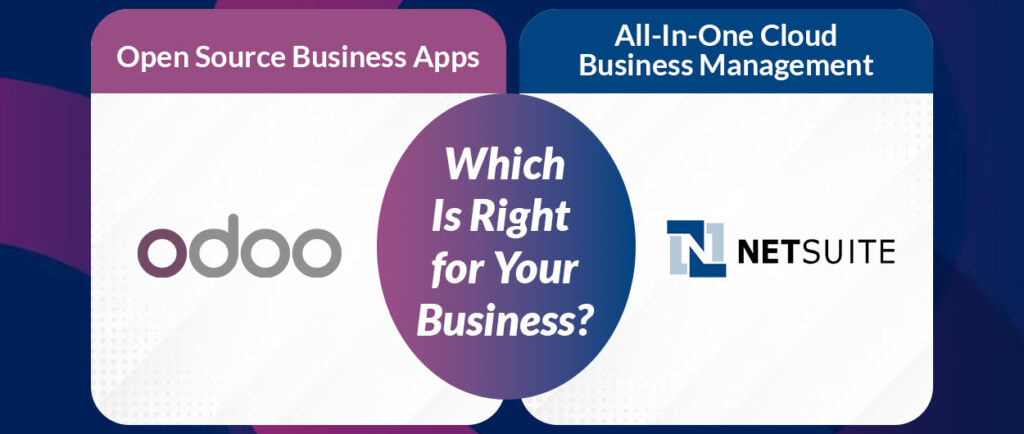Are you finding, running and managing your business with limited resources challenging? It requires a more effective management of the available resources.
But how do you do that?
Enterprise Resource Planning (ERP) solutions are the answer you are looking for here. More than 53% of organizations using these solutions see a positive return, and there is no reason why you cannot be one of them. The rising popularity of these solutions has also made way for many alternatives, and finding the right ERP solution takes work.
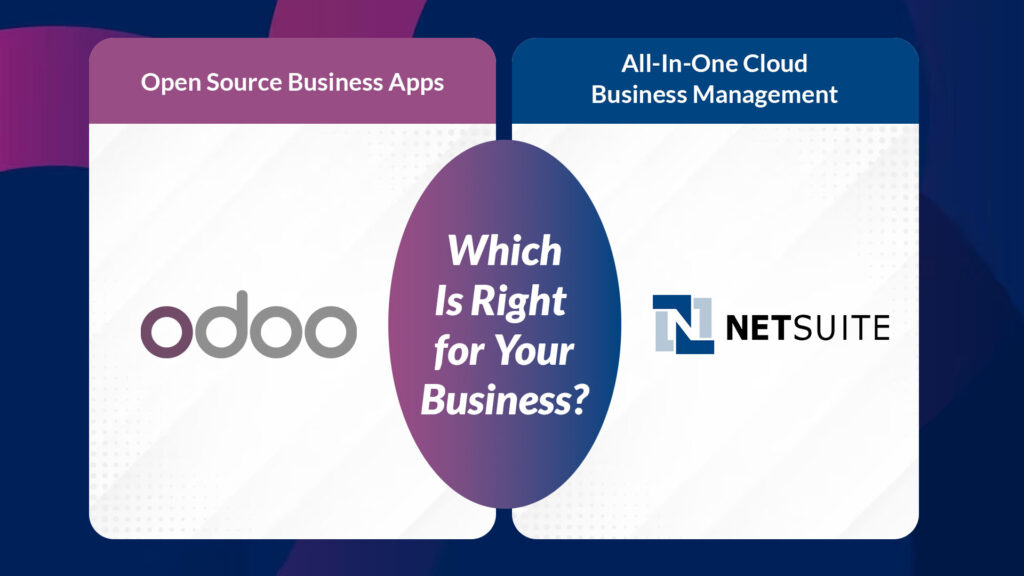
Odoo and NetSuite are the most popular and performant ERP solutions today. So, let’s dive into the details of the NetSuite and Odoo comparison guide to help you make an informed choice.
What is NetSuite?
NetSuite is one of the leading ERP solutions with advanced features for better managing and running a business. This suite of performant tools and software helps you manage customer relationships, human resources, inventory, warehouse, accounts, and invoicing, to name a few. The cloud-based nature of the NetSuite ERP makes it the ideal tool for seamless and comprehensive business management and control.
NetSuite Software Highlights
NetSuite provides businesses with many tools and features that help facilitate better business management and control. So here are some of the highlights of NetSuite:
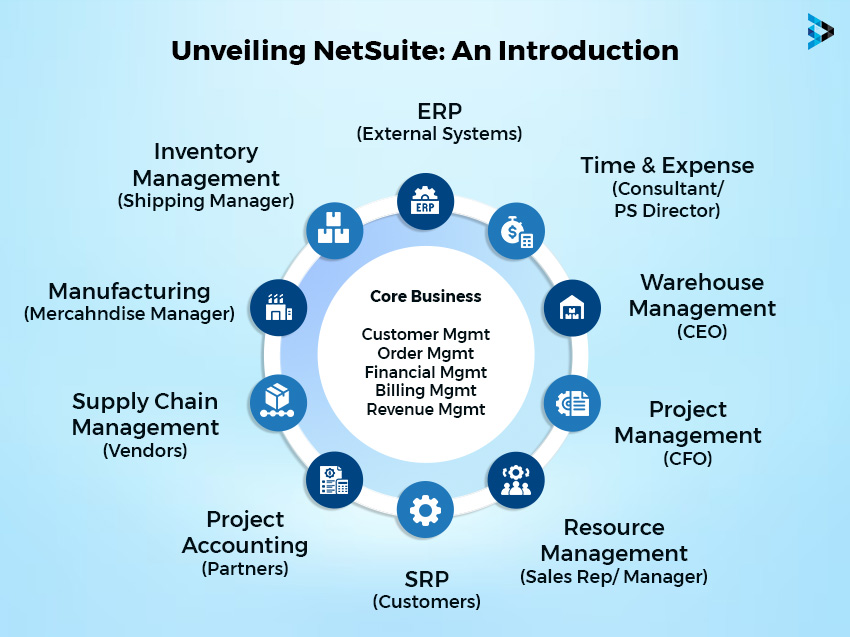
- Native integrations
- Unified view of all business processes
- Unmatched flexibility
- Deep rooting abilities
- Multi-tenant vendor-managed cloud solution

What is Odoo?
Odoo is another prominent ERP solution and one of NetSuite’s most important competitors. This open-source business management suite offers numerous features to efficiently control every aspect of your business. You can use Odoo ERP development to manage operations related to ERP, CRM, HRM, and more. Odoo ERP has an interactive interface, making it the ideal tool for both beginners and professionals. The solution has all the features you need to run a successful business regardless of your scale of operations.
Odoo Software Highlights
Like NetSuite, even Odoo has some unique highlights that set it apart in the crowd. These highlight features include:
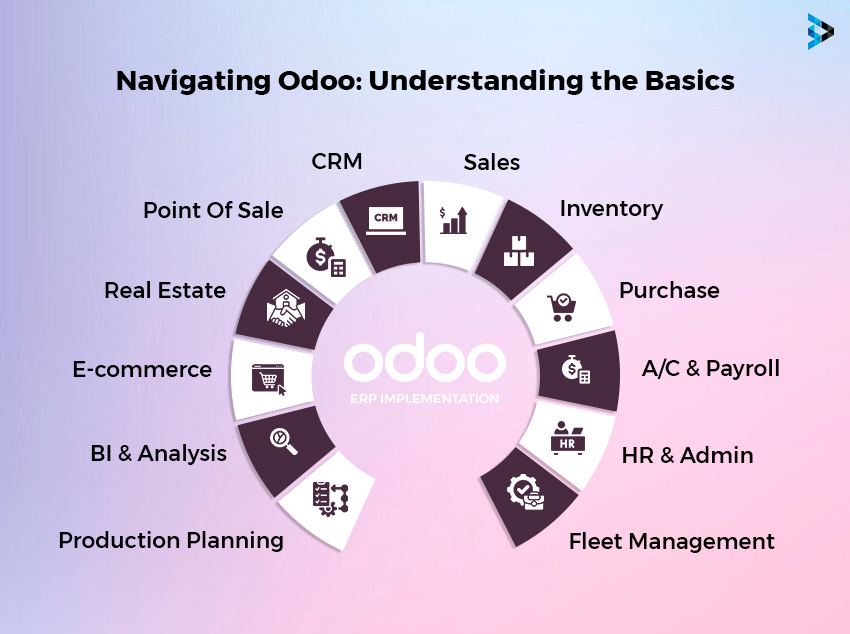
- Seamless integration with multiple business solutions
- Open-source model driving innovation
- Effective customization abilities
- eCommerce platform
- Inventory and sales management
Odoo Vs. NetSuite: The Similarities
While Odoo and NetSuite are two different ERP solutions, they still share specific similar characteristics. It is essential to understand these similar categories before diving into the differences. Here is a tabular representation of similarities between Odoo and NetSuite.
| Similarities | Description |
| Online Payment Support And Management | Both NetSuite and Odoo support online payments through different payment portals and gateways. |
| PoS | ERP solutions allow seamless point of sale (PoS) management and recording features. |
| Order Quoting | You can easily quote orders based on your needs using either of the platforms. |
| Purchase Management | Businesses can easily manage all purchase orders and versions with NetSuite and Odoo. |
| Lead Management | You can use either of the tools to manage your leads and foster effective business growth. |
| Module | NetSuite and Odoo come with different tools available to you in the form of modules |
| Cloud-Based ERP | Both platforms are cloud-based, and you can easily store business information on the cloud. |
| eCommerce Management | You can easily use either of the tools for managing multiple eCommerce business profiles |
| Templates | NetSuite and Odoo have multiple templates you can use for emailing or other purposes. |
| Mail Integration | Both tools give you seamless access to real-time updates with email integration. |
| Accounting and Reporting | NetSuite and Odoo offer many accounting and reporting features for effective management. |
| Client History | Both solutions record the entire history of clients, ensuring you get seamless access when needed. |
| Stock Valuation | You can use the innovative features from either of the platforms to determine the accurate stock valuation. |
| Marketing Management | Both tools offer advanced market management features, ensuring you never miss an opportunity. |
| Budgeting | NetSuite and Odoo offer numerous budgeting features and functionalities. |
| Multiple Companies and Currencies Management | Both the ERP tools support multiple companies and currency management. |
| Expense Management | You can use the features of either tool for seamless expense management. |
| Customer Support Services | Both tools offer effective and relatively similar customer support features. |
Read more: The Future of Business Is Here: Artificial Intelligence and Odoo ERP
NetSuite Vs. Odoo Comparison
With a better understanding of the similarities between Odoo and NetSuite for small businesses, it is time to compare both platforms. Here, we will compare both solutions based on specific criteria that include:
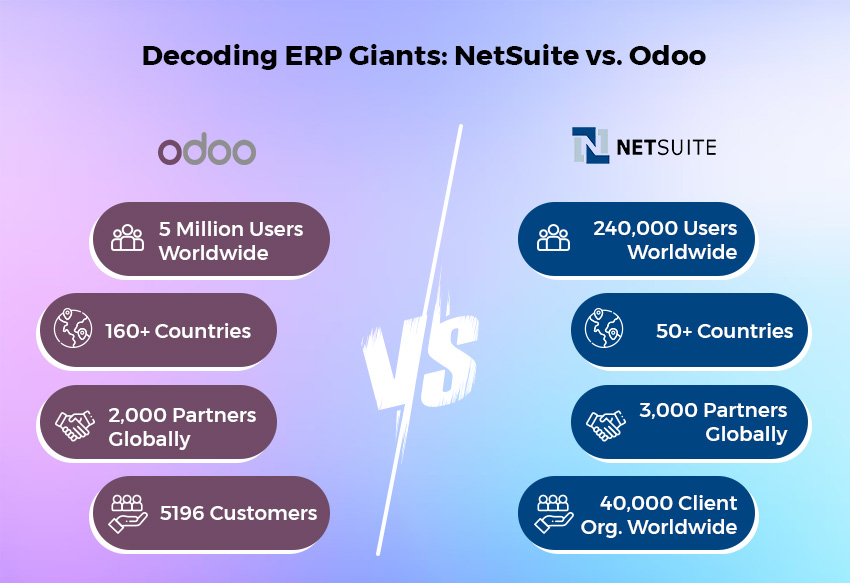
True Multi-Tenant Cloud Solution
NetSuite: Every business using the NetSuite solution leverages the latest software versions with the platform’s automated bi-annual software version updates.
Odoo: Most businesses using the Odoo solution use different versions. Businesses must request Odoo updates, which can cost them dearly while leaving them to deal with the complexities. This leaves out version-locked software, leaving most with delayed and postponed updates.
Customizations Are Flexible
NetSuite: This solution is widely known for its versatility and offers numerous customizations users can conduct with just a few clicks, regardless of its complexity.
Odoo: On the other hand, Odoo offers pre-configured basic customizations through a module. In most cases, these customizations fail to meet the unique needs and requirements of the business. Heavy coding, IT skills, and increased maintenance costs are important if you require more complex customizations.
Extending Value with Applications
NetSuite: NetSuite does an excellent job of enhancing its value with SuiteApps, which offers applications written by the finest partners and certified by NetSuite.
Odoo: Oddo’s offerings here are mostly limited to third-party solutions, and the lack of a partner certification process leaves customers at the risk of getting poorly designed solutions that might conflict with future upgrades.
Supporting Growth and Business Expansion
NetSuite: NetSuite is the ideal platform for driving better business growth, as organizations need not move to a new platform when expanding in size or location.
Odoo: Odoo has a limited capability here as its ability is limited to supporting just fifty users and cannot support international businesses with the basic consolidation capability.
Gartner Magic Quadrant Award
NetSuite: Gartner Magic Quadrant for Cloud Core Financial Management Suites report has ranked NetSuite as a leader for multiple years in a row.
Odoo: The Gartner ERP report has never listed Odoo since it does not have enough mid-sized customers to be considered a proven solution amongst top competitors.
Modules Comparison Between Odoo and NetSuite
Both NetSuite and Odoo come with multiple features for business operation management clubbed into different modules dedicated to specific business operations. This section will compare the modules of NetSuite and Odoo for a comprehensive understanding.
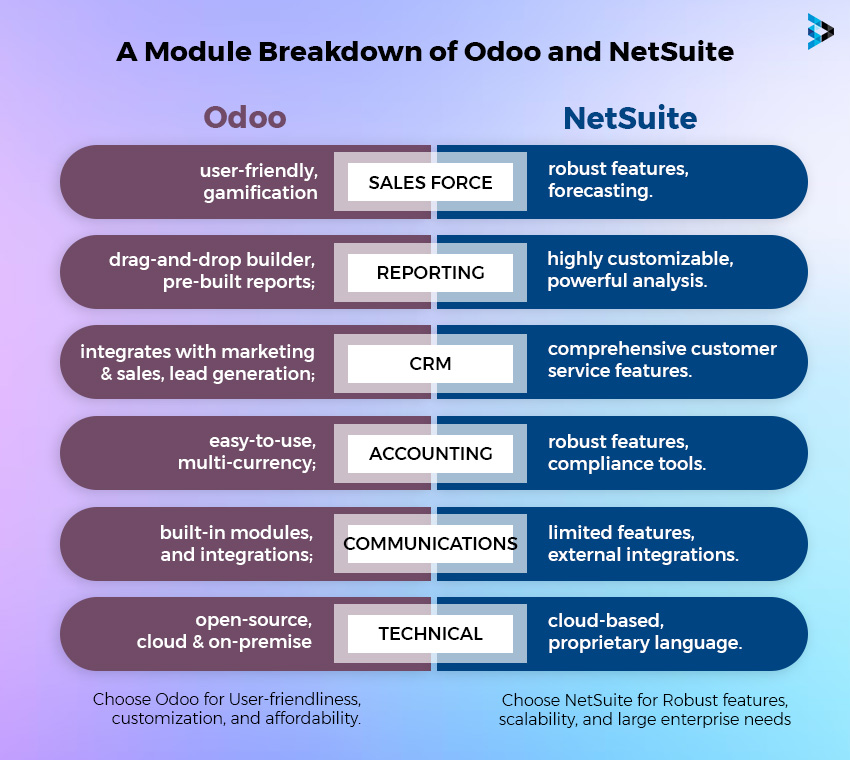
Sales Force Management
Sales is one of the strongest suits of both Odoo and NetSuite. Both solutions have many sales features effectively designed to meet the different requirements of sales teams. However, some differences exist, such as Odoo offering electronic signature capabilities and NetSuite.
Odoo also stands out with its quotation templates that enhance the efficiency of sales workflow. Another catch is that Odoo offers PoS services for restaurant businesses, while NetSuite does not.
Reporting
NetSuite has the upper hand in reporting capabilities, with its portlets displaying real-time business information related to customers, finances, and other relevant areas. But if you want more detailed reports, Odoo might be your better option.
The modular structure of Odoo helps you access more detailed reports on different data points related to your business operations. This helps make more informed decisions with a precise idea of what’s happening.
CRM
NetSuite sites customer management as one of its core functionalities and offers many powerful CRM features. But that does not mean Odoo is lagging in this race since CRM is also one of its strongest suits.
Odoo has an intuitive Kanban view with many new features for better managing your customers’ actions through the pipeline. These factors make Odoo a better choice for effective customer relationship management.
Accounting
Accounting is great with Odoo, as the solution offers many features like smart alerts and batch actions to enhance the efficiency of accounting tasks. Odoo is great in terms of helping you keep track of all accounts in real time.
Odoo also supports more countries, making it a more feasible option for businesses that need international trade. The great thing about NetSuite regarding accounting is that it supports many companies and currencies.
Communications
When it comes to communication, it is fair to say that Odoo has the upper hand. The solutions ensure you enjoy seamless organizational communication with live-chat abilities to connect with website visitors in real-time.
Employees within an organization can use Odoo’s live chat features to facilitate effective communication. Even NetSuite has many features to facilitate effective communication, but these features fall short when compared to what Odoo offers.
Technical Specifications
NetSuite has received many complaints regarding the data storage and migration features the platform offers. However, these things are much more easily manageable with the Odoo ERP solution since users can back up their data anytime.
NetSuite pricing system is also known for limited hosting options, as one can only use it while hosting for the software, resulting in lower flexibility for hosting prices.. Another shortcoming of NetSuite is its reliance on “Cuitescript” and JavaScript, making it challenging to use.
You may like to read:
Odoo Vs. NetSuite Feature-Specific Comparison
Both Odoo and NetSuite have many unique features that set them apart and benefit their users uniquely. So, let’s look at these specific features and compare them for a better understanding.
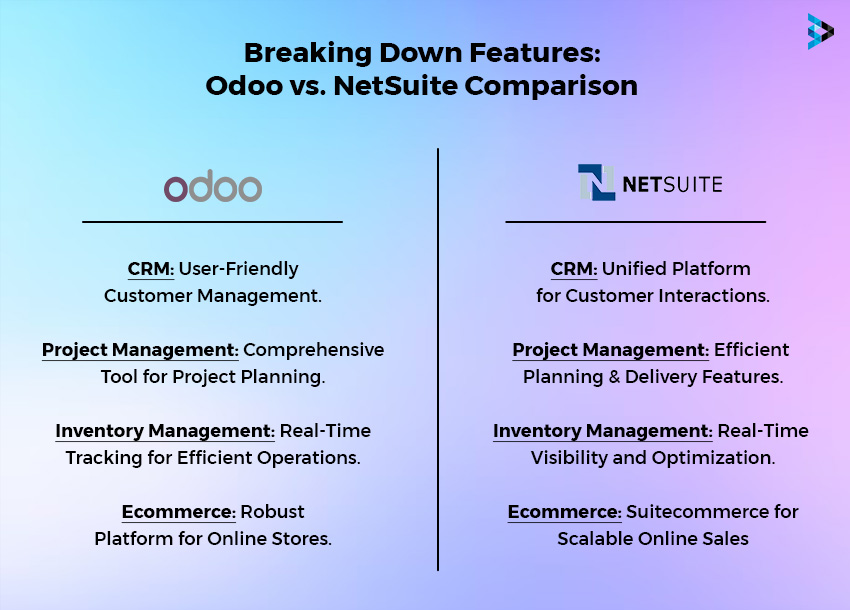
Accounting
Odoo has long been known for its effective accounting features. The solution offers many accounting features, including invoicing, reconciliation, reports, bank synchronization, tax localization, and optical character recognition.
On the other hand, NetSuite is not very far behind in this race since it even has some of the most amazing accounting features. Some of the best-known of these features include accounts payable, general ledger, tax management, payment management, close management, and approval workflows, to name a few.
CRM
Customer relationships are important, and NetSuite has businesses covered on this front with some of the most amazing CRM features. These features include marketing automation, sales force automation, partner relationship management, customer service management, and more.
While not as good as NetSuite on this front, Odoo still has some amazing CRM features that benefit its users differently. Some of the best-known features include CRM gamification, contact form, marketing campaign creation, survey CRM, lead-to-issue, and quotation generation.
Project Management
Project management is challenging, but Odoo offers many features that can help eliminate clutter from the process. Some of the most useful project management features include task deadline reminders, project master reports, subtasks, and project status reports.
Even NetSuite has many useful project management features such as project setup, project dashboards, project center, project budgeting, and project CRM. These features can help enhance the effectiveness of a project and ensure better chances of success.
Inventory Management
NetSuite has many automation features that help simplify inventory management processes for better efficiency. You can use NetSuite to maintain inventory and cycle counts, check item visibility, classify inventory, optimize inventory, and even plan demands with data.
But Odoo is also a great solution for inventory management, as you can manage multiple inventories from a centralized dashboard. Besides that, Odoo provides users with other innovative inventory management features such as shipment tracking, inventory adjustments, advanced reports, and barcode integration.
eCommerce Platform
Running an eCommerce business with the Odoo ERP solution is much more profitable and easier. Thanks to its eCommerce features such as payment gateway integration, live chat, analytics, order management, modern themes, live chat, and more.
NetSuite also has eCommerce features that help you run the business from a centralized solution. The NetSuite SuiteCommerce has all the essential features to run a successful eCommerce business that takes a comprehensive approach.
Odoo Vs. NetSuite Mobile App: A Feature-Focused Comparison
Odoo and NetSuite are among the few ERP solutions with dedicated mobile apps. Users can use these apps to access the solution’s features via their mobile devices. Here, we will compare the following features of NetSuite and Odoo mobile apps.
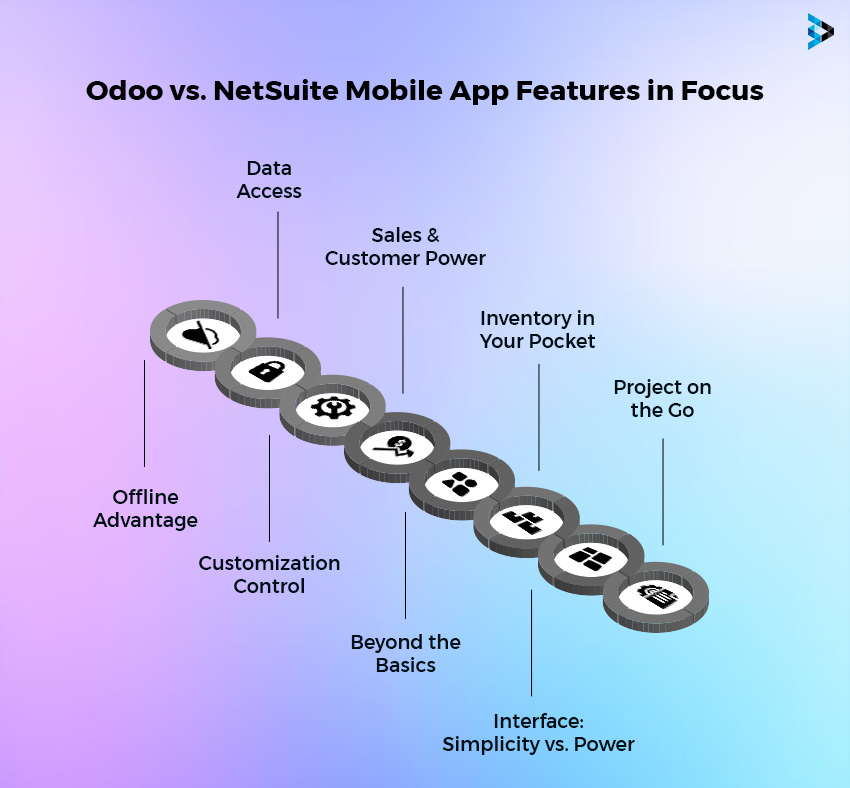
Data Access
Odoo and NetSuite mobile apps allow seamless access to all data, be it recent records, saved searches, or customer information.
Sales and Customer Power
Regarding sales and customer management abilities, both NetSuite and Odoo mobile apps offer many features, but NetSuite is ahead in this race.
Inventory in Your Pocket
Inventory management is more or less similar in the cases of both mobile apps.
Interface: Simplicity vs. Power
NetSuite and Odoo mobile apps have amazingly interactive interfaces that offer seamless navigation and adaptable user experiences.
Offline Advantage
In terms of offline accessibility via mobile apps, NetSuite is a better alternative than Odoo since it offers better offline management features.
Customization Control
Both mobile apps offer customization features to help users make the most of the solution’s features based on their unique needs.
Beyond the Basics
The Odoo mobile app’s functionalities are mostly limited to the basic features, but NetSuite offers many advanced features, such as the ability to customize reports on the go.
Project on the Go
Project management on mobile devices is where both platforms function optimally, leaving no room for complaints.

Which ERP is Better?
Choosing the right ERP is not easy, but the following three considerations will help make this much easier.
- Level of Customization: Odoo offers better customization features than NetSuite, making it better if you are unwilling to change your organizational processes to fit into the software’s functionality.
- The Price: The price is one of the most important considerations, and Odoo beats NetSuite again. Odoo costs $25 a month, while NetSuite charges $125 monthly.
- Software Implementation: NetSuite is yet to be a match for Odoo regarding implementation options since the software still has ample room for improvement.
Given these considerations, most people would go for Odoo ERP without a second thought. But you must evaluate your business’s unique needs before making any solid decision here. If your business needs a better match with NetSuite, you can choose it instead of Odoo ERP.
Read more: How to Start Your Online Shopping Store in Limited Investment Using Odoo?
FAQs
Non-technical users might face some issues using NetSuite, but they can likely easily use the Odoo ERP solution without technical expertise.
Odoo ERP is far more affordable than NetSuite since there is a significant difference between the prices of both platforms.
NetSuite offers better scalability to help growing businesses meet their increasing demands as they grow.
Odoo offers better integration flexibility with other business applications compared to NetSuite.
Odoo has better customization abilities, so choosing this solution would be your best bet to ensure it meets all your business’s needs.
The potential ROI for implementing Odoo or NetSuite depends on how you use these solutions and how they help your business drive better results.
Odoo and NetSuite offer great customer support, as users can easily reach experts to resolve queries via emails, phones, websites, and more.
Related Articles
-
How to Master Your Digital Campaigns with Odoo 14?
Why should you choose Odoo for your business? No, this is not a sales pitch but an opportunity that might just change the meaning of managing efficient digital campaigns for
-
Why Odoo ERP Is The Best Solution For Real Estate Management
The real estate industry has evolved by several folds over the past decade. Gone are the days when operations in the industry were streamlined and would require minimal overview. Over
-
How do you Choose the Ideal Odoo ERP implementation partner?
By now, the chances are that you have become aware of the existence of the Odoo ERP solution. And even if you haven’t heard about it yet, you must be

